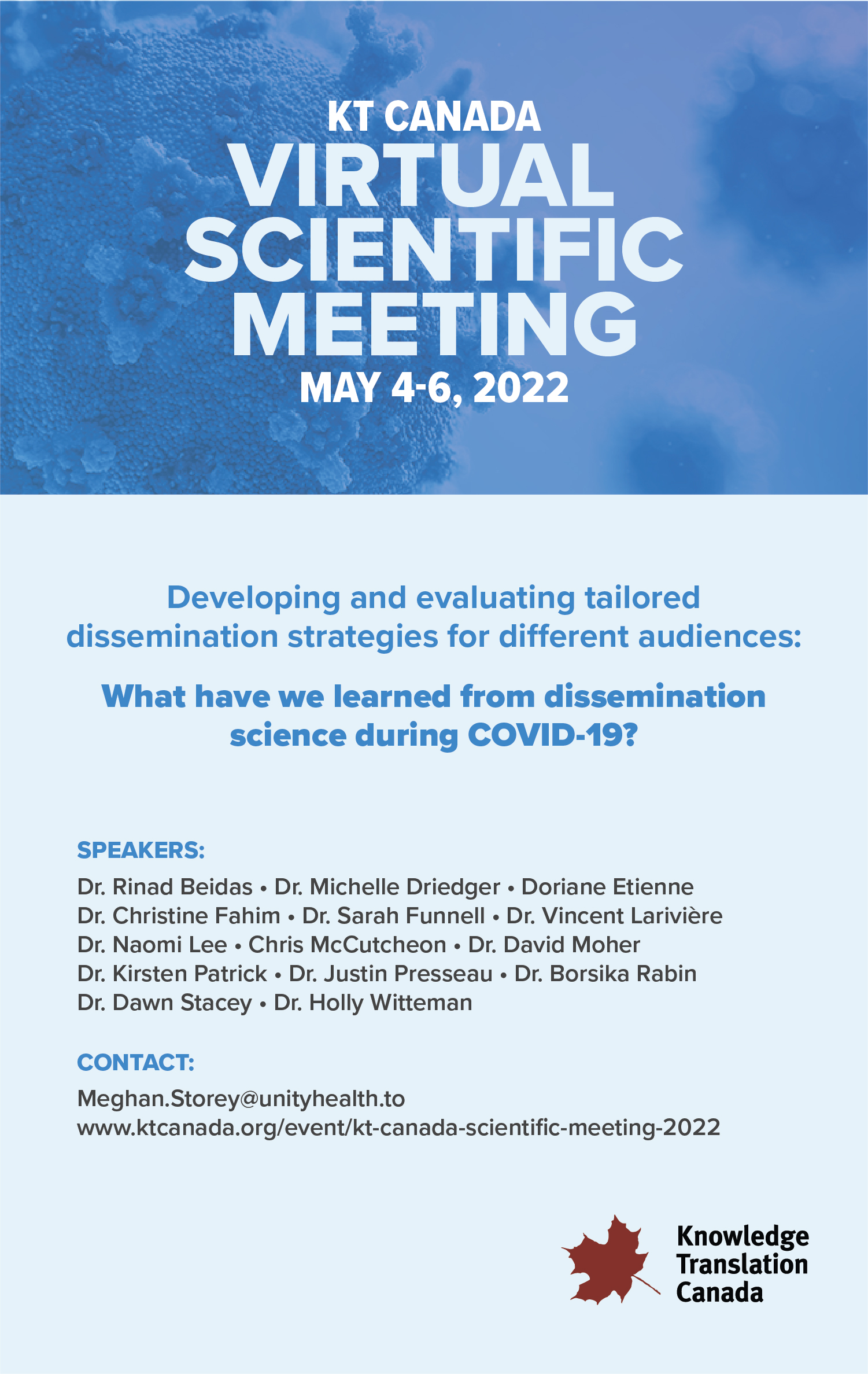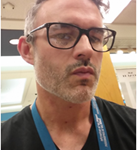
- This event has passed.
KT Canada Scientific Meeting 2022

The 2022 KT Canada Annual Scientific Meeting is being held on May 4-6, 2022 in a *virtual* format.
The theme is ‘Developing and evaluating tailored dissemination strategies for different audiences: What have we learned from dissemination science during COVID-19?’
The deadline for submitting abstracts has now passed.
Please see the “Guest Speakers” tab for information about conference speakers and the “Registration” tab for information about registering.
Further updates will be posted here, on our Twitter account (@KTCanada) and in the KT Canada weekly newsletter.
For questions please contact Meghan.Storey@UnityHealth.to.
Dr. Rinad Beidas
Rinad Beidas, PhD, is the Director of the Penn Medicine Nudge Unit; Founder and Director of the Penn Implementation Science Center at the Leonard Davis Institute (PISCE@LDI); and Associate Director at the Center for Health Incentives and Behavioral Economics (CHIBE). She is an Associate Professor of Psychiatry; Medical Ethics and Health Policy; and Medicine at the Perelman School of Medicine at the University of Pennsylvania. Major scientific discoveries have produced scores of evidence-based practices (EBPs) to improve health and mental health. Unfortunately, many of these EBPs never make their way into routine health care delivery. Implementation science is the study of methods to promote the systematic uptake of EBPs into routine care with the broad goal of ensuring that scientific discoveries realize their potential and improve people’s lives. Her research program is designed to improve the quality of health and mental health services through implementation science. To conduct this work, she collaborates closely with key stakeholders, including patients, clinicians, health system leaders, payers, and policy-makers, to develop natural laboratories in which to answer questions of interest. These labs span diverse health care settings, including community mental health clinics in Philadelphia, the network of Penn Medicine clinics and hospitals serving individuals with cancer, health centers providing HIV care, and the Mental Health Research Network, a national practice-based research network of 14 healthcare systems. Broadly, her work entails three primary foci that draw upon the methods of implementation science: (a) understanding the context in which individuals will implement EBPs, (b) developing implementation approaches that target the factors that may accelerate or hinder implementation, and (c) conducting pragmatic trials to test these implementation approaches. She does this work across disease areas (e.g., mental health, cancer, HIV). She has been identified as a leading implementation scientist and has published approximately 200 articles in this area. She serves as MPI on 2 NIH Centers on behavioral economics and implementation science (P50 MH 113840, P50 CA 244690) and has a strong record of NIH-funded implementation research serving as MPI or PI of 10 NIH grants totaling approximately $30 million dollars. She is deeply committed to training the next generation of implementation scientists and mentors graduate students, postdoctoral fellows, and junior faculty through a variety of mechanisms including a T32 at the intersection of implementation science and mental health. Dr. Beidas holds a bachelor of arts in psychology from Colgate University and a doctorate of philosophy in psychology from Temple University. She is the recipient of a number of awards, including the Association for Behavioral and Cognitive Therapies President’s New Researcher Award in 2015; the American Psychological Foundation Diane J. Willis Early Career Award; and the Perelman School of Medicine Marjorie Bowman New Investigator Research Award in 2017.
Naomi Lee is a Senior Executive Editor at The Lancet. She heads the research section of the journal, and handles peer review and commissioning across a broad range of subjects including her specialist areas of surgery, oncology, digital medicine/AI, and medical technology. She is also a vice chair for the ITU/WHO Focus Group on Artificial Intelligence for Health. Naomi joined The Lancet in 2014. Previously she studied medicine at Cambridge University and King’s College London, before training in surgery, specialising in urology and working for almost 10 years in the UK. She has completed fellowships in Argentina and Mexico. She has also studied data science at University College London.
Doriane is a PhD Candidate in clinical and biomedical sciences at Laval University under the supervision of Holly Witteman, PhD. She is affiliated with VITAM – Centre de recherche en santé durable and Centre de recherche du CHU de Québec-Université Laval. Trained in public health and health marketing and communication, she worked as a project manager in public health and then in digital transformation of organizations. She is currently interested in the design, development and evaluation of user-centered digital health tools in the context of infectious diseases.
Christine (Tina) Fahim is a research scientist at the Li Ka Shing Knowledge Institute, Knowledge Translation program and Assistant Professor at the University of Toronto, Institute of Health Policy Management and Evaluation. Christine obtained her MSc in Health Systems at the University of Ottawa followed by a PhD in Health Research Methods, Evidence and Impact from McMaster University. She completed a postdoctoral fellowship at the Johns Hopkins University, cross-appointed in the Department of Health Policy and Management and Department of Surgery. She holds an Assistant Scientist position in the Johns Hopkins Bloomberg School of Public Health. She specializes in the science and practice of knowledge translation.
Dr. Funnell is a First Nations Family Physician and Public Health Specialist. Sarah is an Associate Medical Officer of Health at Ottawa Public Health and Director of Indigenous Health within the Department of Family Medicine at Queen’s University. Previously Sarah offered Primary Care services for refugees, immigrants, homeless and Indigenous people. Since March 2020, Sarah has directed her attention towards supporting the COVID-19 response and advancing Indigenous Health Medical Education. After completing medical school at the University of Ottawa (U of O), Dr. Funnell pursued her dual interests in family medicine and epidemiology through the five-year Public Health and Preventive Medicine Residency Program at U of O. She received her Certification in the College of Family Physicians of Canada (CCFP) in 2015 and became a Fellow of the Royal College of Physicians and Surgeons of Canada in 2018. Her background is Algonquin (Kitigan Zibi) and Tuscarora and grew up among the Mississaugas of Alderville First Nation. Sarah is on the Board of Directors of both the Indigenous Physicians Association of Canada and the Board of Directors of the College of Family Physicians of Canada. She is also on the Executive of the National Consortium for Indigenous Medical Education (NCIME). Sarah is past co-Chair of the Indigenous Health Committee at the CFPC and also sits on the Indigenous Health Advisory Committee at the Royal College. She is currently working with both colleges to improve Indigenous Health Curriculum in all residency programs. She is lives in Ottawa with her husband and 3 daughters. In her spare time she speaks to her plants.
Vincent Larivière holds the Canada Research Chair on the Transformations of Scholarly Communication at the Université de Montréal, where he is professor of information science and associate vice-president (planning and communications). He is also scientific director of the Érudit journal platform, associate scientific director of the Observatoire des sciences et des technologies (OST) and regular member of the Centre interuniversitaire de recherche sur la science et la technologie (CIRST). His research focuses on science policy, scholarly publishing, and diversity and equity in science.
Chris McCutcheon is a knowledge translation expert who specializes in IKT and health services and policy research. He is currently the manager of the Integrated Knowledge Translation Research Network at the Ottawa Hospital Research Institute. For close to a decade he designed and managed applied research programs for the Canadian Health Services Research Foundation and authored several of their dissemination products. From 2007 to 2010 Chris worked for the Knowledge Translation portfolio of the Canadian Institutes of Health Research (CIHR). While at CIHR, Chris managed IKT research programs, such as Partnerships for Health System Improvement and the Knowledge Synthesis grants. He also designed and piloted Evidence on Tap, CIHR’s first research program designed to produce rapid and relevant research for health-system decision makers. Chris holds a master’s degree in Social and Political Thought from York University. He is co-editor of Research Coproduction in Health Care, forthcoming from Wiley.
Dr. David Moher
Dr. David Moher is a senior scientist, clinical epidemiology program, Ottawa Hospital Research Institute, where he directs the centre for journalology (publication science) (http://www.ohri.ca/journalology/ ). Dr. Moher is also a full Professor, School of Epidemiology and Public Health, Faculty of Medicine, University of Ottawa, where he holds a University Research Chair. Dr. Moher is a fellow of the Royal Society of Canada and the Canadian Academy of Health Sciences. Dr. Moher holds an MSc in epidemiology and PhD in clinical epidemiology and biostatistics. The current focus of Dr. Moher’s research is open science.
Dr. Kirsten Patrick
Dr. Patrick obtained her medical degree and an anaesthesiology qualification in South Africa. She also holds a MSc in Global Health Policy from the London School of Hygiene and Tropical Medicine in the UK. She has worked as a medical editor for 15 years, first at The BMJ and then at CMAJ, where she was recently appointed Editor-in-Chief.
Dr. Presseau is a Scientist at the Ottawa Hospital Research Institute, and Associate Professor in the School of Epidemiology and Public Health and School of Psychology at the University of Ottawa. He is also Chair of the Canadian Psychological Association’s Health Psychology and Behavioural Medicine section. Dr. Presseau has been awarded early career awards from the UK Society for Behavioural Medicine, the International Society of Behavioral Medicine, and the European Health Psychology Society, a mid-career award from the Canadian Psychological Association, and is an Associate Editor for Implementation Science. Dr. Presseau’s research program operates at the intersection between health psychology and implementation science, drawing upon behaviour change theories and methods to design and evaluate theory-based strategies for promoting healthcare professional behaviour change to increase best practice and reduce non-evidenced healthcare.
Dr. Rabin is an Associate Professor at the UC San Diego Herbert Wertheim School of Public Health and Human Longevity Science, the Co-Director of the UC San Diego Dissemination and Implementation Science Center (DISC) and the San Diego CFAR Implementation Science Hub, and an Implementation Science (IS) expert on a number of large NIH and VA Center grants and research projects including the VA San Diego Center of Excellence for Stress and Mental Health and the Quadruple Aim QUERI Program (Denver VA). Dr. Rabin’s research focuses on improving population health outcomes in real-world clinical and public health settings through increasing the equitable reach, adoption, implementation, and sustained use of evidence-based interventions. She does this through the development of models, methods, and measures for dissemination and implementation science and their application across diverse topic areas, populations, and settings in order to demonstrate their wide utility and broad generalizability. Dr. Rabin also has extensive expertise in developing and implementing novel and diverse capacity building approaches for dissemination and implementation research.
Dawn Stacey RN PhD FAAN FCAHC FCAN holds a Research Chair in Knowledge Translation to Patients and is a Professor in the School of Nursing at the University of Ottawa. She is a Senior Scientist and Scientific Director of the Patient Decision Aids Research Group at the Ottawa Hospital Research Institute. She leads the Cochrane Review of Patient Decision Aids, co-chairs of the Steering Committee for the International Patient Decision Aid Standards Collaboration (IPDAS) and collaborates on the Cochrane Review of Interventions for Increasing the Use of Shared Decision Making. More specifically, her research program focuses on: a) patient decision aids; b) decision coaching; c) implementation of evidence into practice; d) telephone-based care, and e) interprofessional approaches to shared decision making. She has >290 peer-reviewed publications and given >160 invited national and international presentations. In 2020, she won the Nursing Research Excellence Award from the Canadian Association of Schools of nursing and the University of Ottawa Award for Excellence in Research. For more information visit her research websites https://decisionaid.ohri.ca; https://ktcanada.ohri.ca/costars
Dr. Andrea C. Tricco (PhD, MSc) is a Scientist and Director of the Knowledge Synthesis Team in the Knowledge Translation Program of the Li Ka Shing Knowledge Institute, St. Michael’s Hospital. She is an Associate Professor at the University of Toronto in the Dalla Lana School of Public Health & Institute of Health Policy, Management, and Evaluation. She is also a Co-Director & Adjunct Associate Professor for the Queen’s Collaboration for Health Care Quality Joanna Briggs Institute (JBI) Centre of Excellence at Queen’s University. Dr. Tricco is a knowledge synthesis methodologist with >270 publications in this area, including papers in high-impact journals (e.g., British Medical Journal , Journal of the American Medical Association, Lancet). She currently holds a Tier 2 Canada Research Chair in Knowledge Synthesis. She has been commissioned by several agencies to conduct knowledge synthesis, such as the World Health Organization and Ontario Ministry of Health and Long-term Care. Her research has been covered by major media outlets, such as CTV News, Global News, and Radio Canada International. She has presented at >190 local, national, and international meetings and led >60 reports for decision-making agencies. She is also an Associate Editor for the Journal of Clinical Epidemiology, and Systematic Reviews; and sits on the Editorial Board for BMC Medicine and JBI Evidence Synthesis. She developed and teaches an online systematic review course that >560 students have completed.
Holly Witteman, PhD, is the Canada Research Chair in Human-Centred Digital Health and a Professor in the Department of Family & Emergency Medicine, Université Laval, Quebec City, Canada. Quebec City is unceded traditional territory of the Huron-Wendat. Dr. Witteman is a scientist in the VITAM Research Centre for Sustainable Health, the Research Centre of the CHU de Québec-Université Laval, and an Affiliate Investigator at the Ottawa Hospital Research Institute, Ottawa, Canada. With an interdisciplinary background in human factors engineering and social sciences, her research is about how we can achieve human-centredness in health-related domains, including a focus on how best to adapt digital health technology to people rather than expecting people to adapt to technology. She specializes in human-computer interaction in health education, risk communication and decision making, including design methods and system changes to support inclusive user-, human- and patient-centredness. Her work as Principal Investigator has been funded by the Fonds de recherche du Québec – Santé (FRQS), the Patient-Centered Outcomes Research Institute (PCORI, United States), the Canada Foundation for Innovation (CFI), the Canadian Immunization Research Network (CIRN), Sentinelle Nord, and the Canadian Institutes of Health Research (CIHR).
Registration for the KT Canada Virtual Scientific Meeting will open on Feb. 1, 2022.
You may register here: https://www.eventbrite.com/e/kt-canada-virtual-scientific-meeting-2022-tickets-251323313797
The deadline to register is May 1st, 2022.
Fees
Regular: $225
Students & Fellows: $70
Patients and Caregivers: Please contact Meghan directly: Meghan.Storey@unityhealth.to
<!--Registration is now open for the KT Canada Virtual Scientific Meeting. You may register here. The deadline to register is May 1st, 2021. Fees Regular: $210 Students & Fellows: $55 Patients and Caregivers: Please contact Meghan directly: Meghan.Storey@unityhealth.to-->
- Oral Presentations
Oral presentation time will be 15 minutes in total, which includes 5 minutes for Q & A. The presentation recording and PDF of slides will be posted in the online event space. Registered meeting participants will be able to view these leading up to the meeting, during the meeting dates, and after the meeting. The abstracts for each project will also be posted in the online meeting space and in the meeting program.
Technical info:
- Please send a 10-minute video recording of your presentation, in MP4 format.
- Please send a PDF of your slides.
- We recommend using the Vimeo screen recorder to create your recording. It is free, it is quite user-friendly and the product has clear audio and visuals.
- It is your choice if you would like to include the webcam view of you presenting. In general audiences seem to prefer when they can see the presenter but we are giving you the choice.
- If you have a different preferred software for creating your mp4, that is fine! That said, we do not recommend using Zoom to make the recording, if possible. When a recording is created in Zoom and re-played in Zoom, the visual quality tends to be diminished.
- Please make sure text is large and there is strong contrast between text and background. We recommend minimum font size of 24 pt.
- Contrast checker here.
- Please ensure you describe any graphs, images, etc.
- Be aware that videos may be laggy.
Oral presentations format: we will play the 10-minute recorded presentation for the audience over Zoom. We would like the presenter to be online and available during that time. Once the 10-minute recording has concluded, there will be approximately 5 minutes of live Q&A. The audience may submit questions using the chat box or the Q&A function. There will be a moderator assigned to the session to read out the questions that come in. The presenter will be able to answer aloud (i.e. not restricted to the chat box).
Please send your materials (presentation recording & slides) by Monday, April 25th.
Please send to: KTCanadaFiles@gmail.com. We recommend using https://wetransfer.com/ to send large files.
- Poster Presentations with live Q&A
The top-ranked 18 posters will get approximately 5 minutes with the plenary group during a live meeting session. During the 5 minutes, we will play their 3-minute recording and then they will get up to 2 minutes for Q & A. There will be a moderator.
The recording and PDF of the poster will be available to view in the online meeting space before, during and after the meeting. The abstracts for each project will also be posted in the online meeting space and in the meeting program.
Technical info:
- Please send an up-to 3-minute video recording of your presentation, in MP4 format. In the past, presenters used 1-3 slides in their recording which help explain the information on the poster.
- Please send a PDF of your poster. There are no rules about poster dimensions or orientation.
- We recommend using the Vimeo screen recorder to create your recording. It is free, it is quite user-friendly and the product has clear audio and visuals. Screencastify also works well and is free for videos < 5 minutes long.
- It is your choice if you would like to include the webcam view of you presenting. In general audiences seem to prefer when they can see the presenter but we are giving you the choice.
- If you have a different preferred software for creating your mp4, that is fine! That said, we do not recommend using Zoom to make the recording, if possible. When a recording is created in Zoom and re-played in Zoom, the visual quality tends to be diminished.
- Please make sure text is large and there is strong contrast between text and background. We recommend minimum font size of 24 pt.
- Contrast checker here.
- Please ensure you describe any graphs, images, etc.
- Be aware that videos may be laggy.
Please send your materials (presentation recording & slides) byMonday, April 25th.
Please send to: KTCanadaFiles@gmail.com. We recommend using https://wetransfer.com/ to send large files.
- Poster Presentations without live Q&A
For the posters that were not ranked in the top 18, the recording and PDF of the poster will be available to view in the online meeting space before, during and after the meeting and attendees will be encouraged to visit them and to contact presenters when interested in their work. The abstract will also be posted in the online meeting space and in the meeting program.
Technical info:
- Please send an up-to 3-minute video recording of your presentation, in MP4 format. In the past, presenters used 1-3 slides in their recording which help explain the information on the poster.
- Please send a PDF of your poster. There are no rules about poster dimensions or orientation.
- We recommend using the Vimeo screen recorder to create your recording. It is free, it is quite user-friendly and the product has clear audio and visuals. Screencastify also works well and is free for videos < 5 minutes long.
- It is your choice if you would like to include the webcam view of you presenting. In general audiences seem to prefer when they can see the presenter but we are giving you the choice.
- If you have a different preferred software for creating your mp4, that is fine! That said, we do not recommend using Zoom to make the recording, if possible. When a recording is created in Zoom and re-played in Zoom, the visual quality tends to be diminished.
- Please make sure text is large and there is strong contrast between text and background. We recommend minimum font size of 24 pt.
- Contrast checker here.
- Please ensure you describe any graphs, images, etc.
- Be aware that videos may be laggy.
Please send your materials (presentation recording & slides) by Monday, April 25th.
Please send to: KTCanadaFiles@gmail.com. We recommend using https://wetransfer.com/ to send large files.
<!--Please click here to view and download the program at a glance.-->















